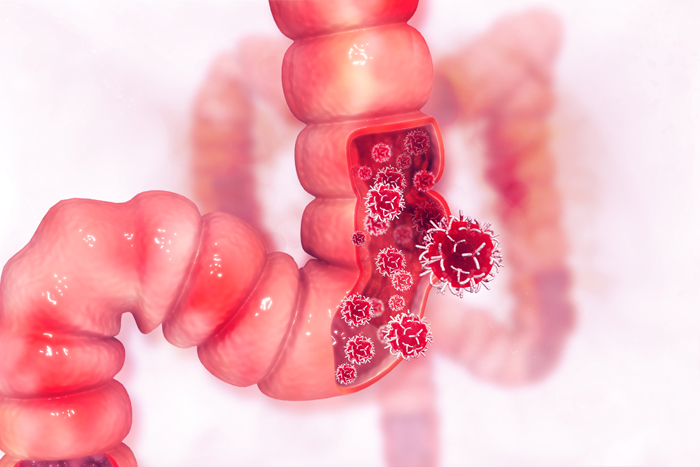Colon Cancer Treatment in C-scheme, Jaipur
Colon cancer is one of the most common cancers affecting men and women. Colon cancer is also called Colorectal cancer where both colon cancer and rectum cancer co-occur.
What is Colon Cancer?
The colon, also called the large intestine, is the largest and last part of the digestive tract. Colon cancer is the type of cancer that develops tumorous growth in the inner walls of the large intestine or rectum. Both are present in the lower parts of the digestive system. The rectum is located at the end of the colon. Small clumps of cells are formed on the walls of the colon called polyps. Once these polyps develop and multiply, it leads to colon cancer.

What Are the Stages of Colon Cancer?
There are five stages of colon cancer, stage 0 being the earliest and stage 4 that advanced.
- Stage 0: In this stage, the tumorous growth is only in the inner walls of the colon. It is called carcinoma
- Stage 1: In this stage, the tumour has penetrated the lining of the walls of the colon or rectum.
- Stage 2: In this stage, the tumour has spread throughout the walls of the colon or rectum to the nearby tissues.
- Stage 3: In this stage, the tumour has spread to the lymph nodes.
- Stage 4: In this stage, the tumour has spread to other significant organs of the body such as the lungs or liver.
What Are the Symptoms of Colon Cancer?
Usually, the symptoms do not act during the early stages of cancer. However, there are chances for the following symptoms in the early stages:
- Change in colour of stools
- Diarrhoea
- Constipation
- Bleeding from rectum
- Pain in the abdomen
- Bloody stools
The symptoms which are seen in the later stages of colon cancer include:
- Fatigue
- Loss of appetite
- Excessive weakness
- Vomiting
- A sensation of incomplete bowel movements
- Swollen hands or feet
- Jaundice
- Shortness of breath
- Fracture in bones
- Blur vision
- Severe Headaches
- Narrow or loose stools
What Are the Causes of Colon Cancer?
The following factors contribute to the causes of Colon cancer:
- Age: People who are above the age of 50 are likely to get colon cancer.
- Overweight people: It is observed that people who follow a diet rich in fat are more likely to have colon cancer.
- Heredity: Around 20% of people get diagnosed with colon cancer because of family history or genetic inheritance.
- Untreated polyps can lead to malignant tumours in the organs.
When to See a Doctor at Apollo Spectra, Jaipur?
Colon cancer can be present with or without the presence of symptoms. However, if the following symptoms persist, it is important to see the best specialist in Jaipur:
- Irregular or incomplete bowel movements
- Narrowing of the stools
- Blood in stools
- Severe abdominal pain
- Diarrhoea
- Constipation
- Excessive Vomiting
It is advised to tell the doctor if you have a family history of colon cancer or polyps. It is important to see a doctor in the early stages of colon cancer and get treatment as it can be life-saving.
How Can Colon Cancer Be Treated?
The treatment for colon cancer depends on the following factors:
- A person’s overall health
- Location of the tumour
- Size of the tumour
- Stage of cancer
- Whether tumorous growth is recurrent
Treatments are available such as:
- Surgery: If the cancers begin to spread to the nearby lymph nodes, surgery is performed. The surgeon removes the tumours, cancerous tissue, and the nearby affected lymph nodes to prevent them from spreading. This treatment is generally limited to the Colon.
- Chemotherapy: It is the usage of drugs to destroy or shrink the tumour throughout the body. It also relieves the pain that occurs in later stages.
- Radiation Therapy: In this treatment, high radiation energy is used to destroy the tumour or cancerous cells thereby preventing them from multiplying.
- Immunotherapy: In this treatment, the drugs are used to help the immune system to detect the tumour or cancerous cells and destroy them.
- Targeted therapy: This treatment allows the use of drugs that target the significant protein to slow, reduce or prevent the growth of tumour or cancerous cells.
If cancer spreads beyond the colon, stage 4, it won’t be treatable anymore. In such cases, Palliative care is recommended. It generally helps to improve the quality of life by providing relief from pain or symptoms.
Conclusion
Colon Cancer is the most common cause of cancer-related death. Treatment in the early stages of colon cancer prevents the tumour or cancerous cells from multiplying and is removed. However, delay in treatment can only worsen the condition and can be life-threatening.
Request an appointment at Apollo Spectra Hospitals, Jaipur
Call 1860 500 2244 to book an appointment.
- Quit Smoking
- Avoid drinking alcohol
- Eat healthy vegetables and fruits.
- Maintain a healthy weight
- Follow a strict healthy diet
- Exercise at least 5 days a week
- Colon Screening: Detects the polyps before they become cancerous. It also helps in detecting the early stages of cancer.
- Imaging scans such as ultrasound, CT, MRI show whether cancer has spread to the different organs
- Blood stool tests
- Colonoscopy: The use of an instrument called a colonoscope which has light and a camera is used to detect the polyps or cancerous cells throughout the colon or rectum.
- Nausea
- Vomiting
- Diarrhoea
- Hair loss
- Rashes
- Loss of appetite
Symptoms
Our Top Specialities
NOTICE BOARD
CONTACT US
CONTACT US
 Book Appointment
Book Appointment


.svg)
.svg)
.svg)
.svg)








